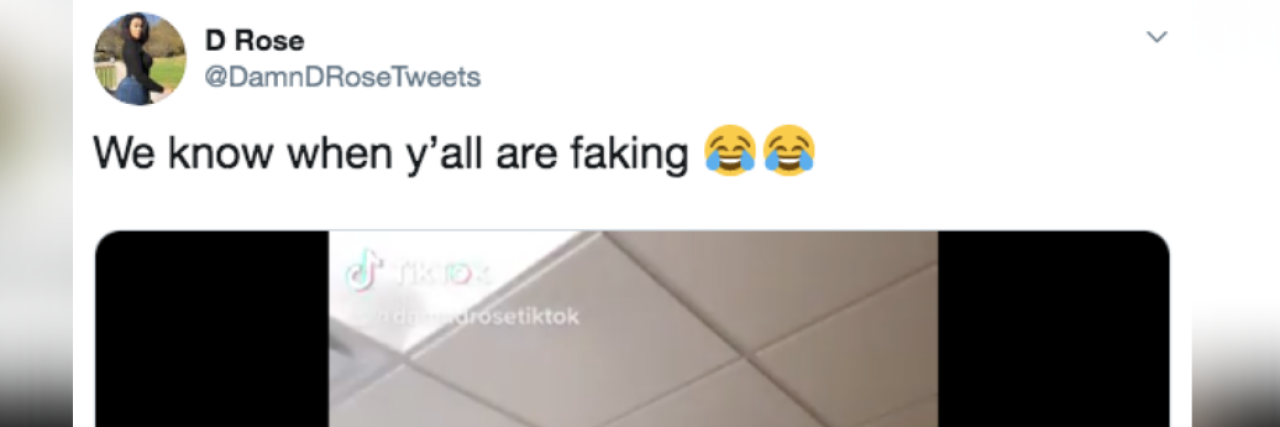Viral TikTok Video Ruthlessly Mocks Patients Who 'Fake' Their Symptoms
A TikTok video making its way around Twitter this week feels like a personal attack on the chronic illness community. The viral video, which was made and posted by Twitter user D Rose, depicts a medical professional “catching” a patient faking severe shortness of breath. D Rose, who is a health care provider in real life, pretends to be the patient.
We know when y’all are faking ???????? pic.twitter.com/uBV9LjXN3W
— D Rose (@DamnDRoseTweets) November 19, 2019
While the video is intended to be funny, it actually serves as a dark reminder that some medical professionals are suspicious of our symptoms. It mocks people who supposedly “exaggerate” their symptoms, warning us that nurses know who the “fakers” are.
It’s a window into the reality people with chronic illnesses battle, sometimes daily, with medical professionals.
It’s a reality when we go to our doctors with a new symptom and it’s brushed off as anxiety or stress.
It’s a reality when we discover a co-morbid condition has been developing for years but our concerns are disregarded because it’s too similar to our other symptoms.
It’s a reality when we end up in the emergency room for abdominal pain after a visiting nurse at our doctor’s office decided the pain was caused by binging and purging habits that never existed.
It’s a reality when people with mental health issues aren’t taken seriously and when mental health days are frowned upon and turned into headlines about “lazy millennials.”
It’s a financial reality that’s reflected in the huge influx of money spent simply trying to find that one doctor who will hear you out.
Although D Rose’s video takes place in a doctor’s office, the reality goes further. The medical professional in the video implying people fake their symptoms only adds to the real mountain of misconceptions already held about chronic illness and disability.
These beliefs prevent me and many others from using disability parking placards in fear that we’ll be harassed for not appearing disabled enough. These beliefs prevent people from checking their mail because their neighbor has only ever seen them use a wheelchair and they fear the repercussions of taking that short walk.
Society hasn’t yet grasped how many ambulatory wheelchair users exist, and in the eyes of society, the good days when we rely less on mobility devices invalidate the need for the device in the first place.
It goes in circles — starting with a TikTok about faking symptoms, which only further ingrains the beliefs of society, which comes right back around to the doctor’s office.
What happens when people simply stop bringing up their symptoms to their doctors? What happens when we stop having confidence in doctors, or start believing the nurses who draw our blood and take our vitals actually believe we’re faking it all?
How do we stand up against the systems that are failing us, and failing women of color disproportionately, when the allies we need to help reduce the discrimination already rampant within the system are the ones creating these very videos? People who are supposed to be helping us are laughing at us, while, as pointed out by disability advocates including Imani Barbarin and Ola Ojewumi in response to the video, real people are being refused treatment for their symptoms, and as a result, are dying.
That video of the nurse dancing not believing patients has stirred up a lot of trauma for many in the disabled community and BIPOC communities.
People get killed because of that mentality. You did a whole video to tell us you’re bad at your job.#PatientsAreNotFaking
— Crutches&Spice ♿️ : Rude For A Disabled Person (@Imani_Barbarin) November 22, 2019
We live in a world where we — the disabled, the chronically ill and the ones with mental illness — are forced to perform for the able-bodied population. We are forced to physically manifest our symptoms to receive even a fraction of the proper care we need.
And we’re tired. We’re tired of performing and begging for representation and acknowledgment.
What we want is to be taken seriously, and although the video is meant to offer comic relief, it represents the real conversations we’ve overheard, the real refusal of care we’ve received and the daily discrimination directed at us in every aspect of our lives.
We need to all reach a place where we feel confident trusting these professionals with every aspect of our conditions. Being able to trust our health care professionals is vital to our care — and videos like this only makes that more challenging.
Editor’s Note: On Nov. 22, D Rose responded to the backlash on Twitter, stating, “Please keep in mind that your perception is yours alone and is based on OPINION. The FACT is my video had nothing to do with race, mocking panic attacks, or anything else I’ve been accused of. … If it triggered a bad memory for you, I had no way of knowing that and took no part in that. It was not directed to anyone.” See her full response here.
What do you think? Let us know in the comments below.

